Choosing an unsuitable eCommerce platform can lead to out-of-control fees, time-consuming processes, and subpar customer experience. But in the Shopify vs Square comparison, which would be ideal for your business?
As a trusted custom Shopify development partner, we’ve helped businesses like Kit & Kin and Yara find the right eCommerce platform for their specific needs. You can browse our works to see our expertise in action.
So, which is better, Shopify or Square? We’ll break down how the two compare in terms of pricing, functionality, and more, as well as the peculiarities of Square integration with Shopify.
Of course, a platform suitable for small business operations will not have the same functionality and pricing as that for a large-scale enterprise. So, as you read this blog post, be mindful of your requirements and needs.
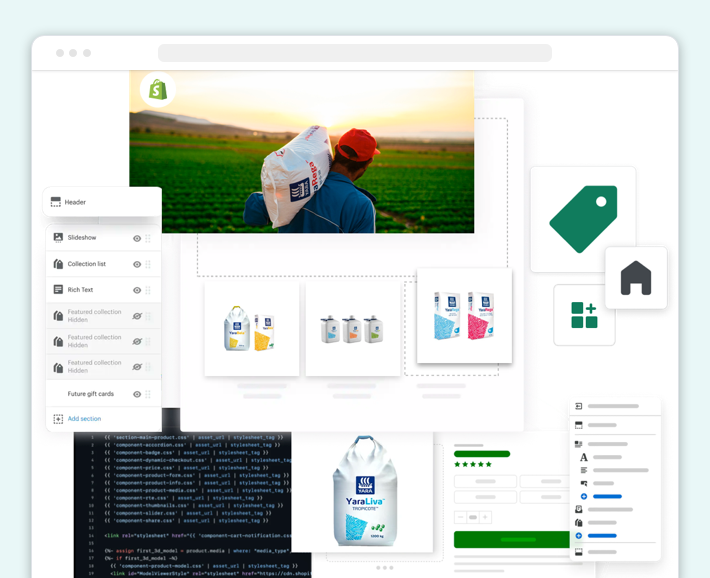
Table of Contents
Square vs Shopify: Your Quick Introduction
Shopify is one of the most popular eCommerce platforms, powering almost 5.5 million currently live websites. This eCommerce heavyweight also launched its POS system in 2013.
Square was launched as a card reader for mobile devices in 2009 and is the brainchild of Jack Dorsey, the co-founder of Twitter. Today, Square offers 36 products used by four million retailers across eight countries.
Is Shopify or Square better? Before we dive into how Square vs Shopify website building and other capabilities compare, let’s introduce you to both.
What Square Offers
Square’s key product is its POS system distributed under both a free plan and several paid ones, with the latter starting at $29/month. Square also offers packages tailored to restaurants, retailers, and appointment-based businesses like salons or construction businesses.
Under all plans, you can create and launch an online store using a website builder.
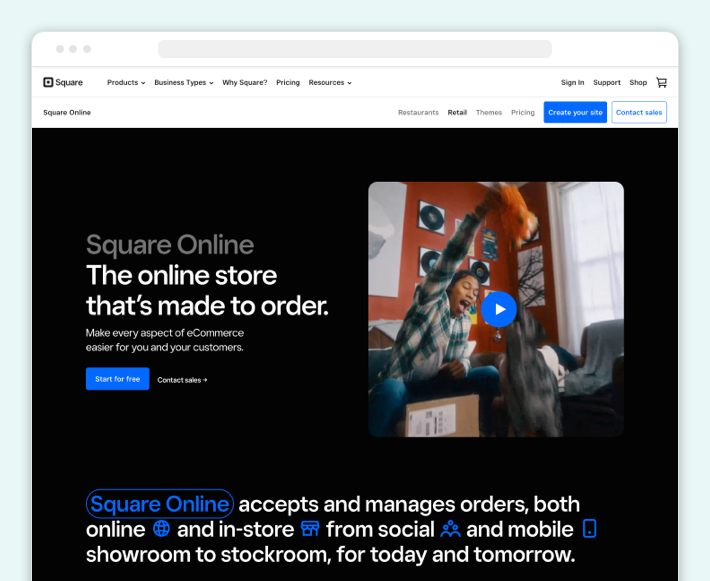
What Shopify Offers
Shopify focuses primarily on helping users build and run eCommerce businesses under four plans: Basic, Shopify, Advanced, and Plus. Each plan is designed to meet the needs of businesses of different sizes, from small stores to large enterprises.
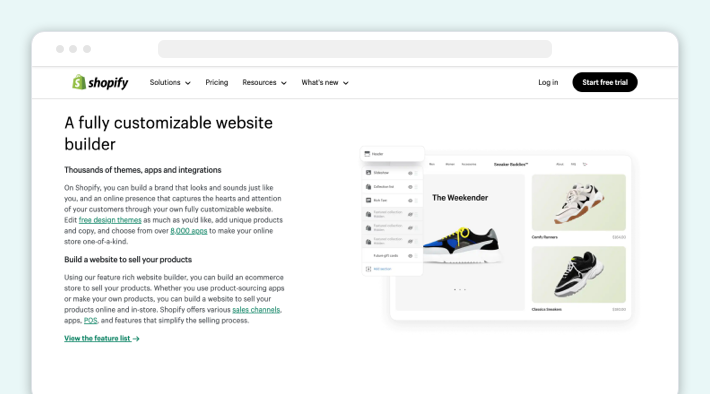
Square vs Shopify: Your Snapshot
Whether you’re pondering switching from Square to Shopify or starting fresh on a new eCommerce platform, here’s our comparison at a glance:
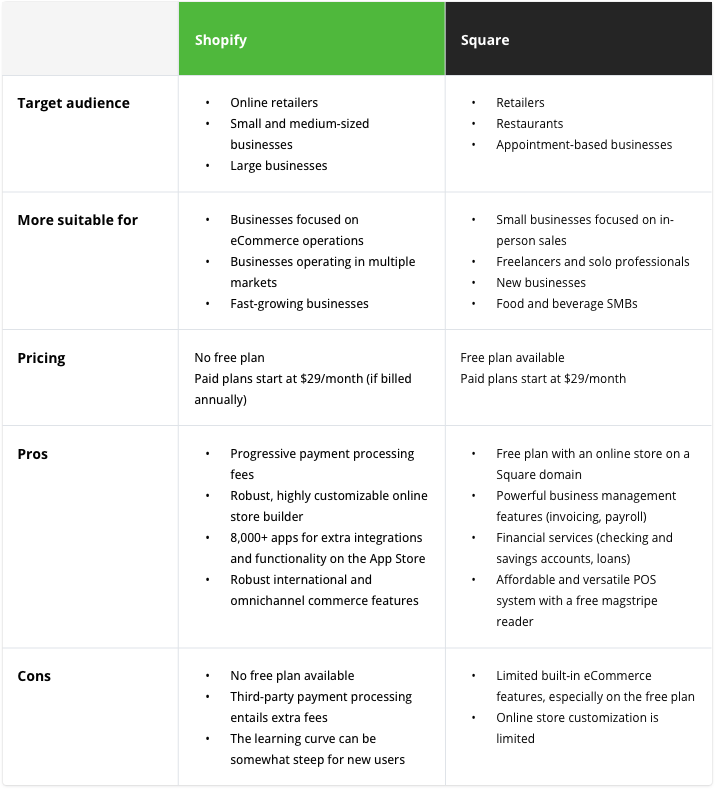
Shopify vs Square: POS and Business Management Features
Our first round of the Shopify vs Square showdown concerns all the features to facilitate running your business.
Square’s Features
Square’s strengths include its POS system, invoicing and payroll features, and financial services.
Point-of-Sale System
Square’s POS merchant system allows for processing a variety of payments (transaction fees apply):
- In-person debit and credit card payments
- Online store payments
- Manually entered card details
- Invoice payments
Besides the POS software, you can also purchase hardware like Square Register, Stand, Terminal, Kiosk, or Card Reader to accept payments in person. The first magnetic stripe reader is free.

Invoicing
Square offers a free and paid plan for its invoicing features (both, however, come with separate payment processing fees). Here’s what you can do for free:
- Create and send unlimited digital invoices, estimates, and contracts
- Schedule unlimited recurring invoices
- Send automatic reminders
- Track invoice payment and estimate status and cash flow in real time
Payroll
Square Payroll is an additional paid tool that facilitates:
- Tracking hours worked
- Automating payments
- Managing employee benefits
- Automating tax filings
Financial Services
Square offers several financial services to entrepreneurs:
- Checking account with a free business debit card, no recurring fees or minimums
- Savings account
- Loans of up to $250,000 for a flat fee instead of interest
Shopify’s Features
Shopify’s strengths lie in its automation, inventory and order management, customer support, and analytics features.
Inventory and Order Management
Shopify offers a comprehensive toolkit for managing your inventory and orders, whether you operate solely online or sell items online and offline. It includes:
- Smart order routing
- Real-time shipping rate calculation
- Multi-location inventory management
- Inventory transfers and adjustment reasons
- Comprehensive reporting and analytics
Shopify also offers discounts on shipping rates through partnerships with carriers.
Shopify Inbox
This feature, included in all plans at no extra cost, allows you to add a live chat to your online store – without any coding required. It can be set up to:
- Display welcome and other automated messages
- Provide genAI-powered answers
- Connect users with your customer service team
Reporting and Analytics
Whichever Shopify plan you choose, you can gain insights into your business’ performance via 60+ pre-built report templates and comprehensive analytics. Shopify allows you to:
- Compare your store’s performance with others’ via Benchmarks
- Understand your customers better with customer cohorts
- Track your performance across multiple marketing channels
Automations
With Shopify Flow, you can create custom automated processes for virtually every aspect of eCommerce operations. Shopify Flow is a no-code tool for building custom marketing, order management and fulfillment, inventory management, and other workflows.
Verdict
Square offers a versatile POS system and business management capabilities that can make running a business a cakewalk. However, they’re more suitable for offline-first businesses.
Shopify has built its business management capabilities with eCommerce businesses in mind. Although the platform supports offline sales as well, it’s best for online-first stores.
As GenovaWebArt’s expert puts it, “Entrepreneurs tend to choose Square for its POS and business management features that can save tons of time. But if you need solid eCommerce capabilities, you’ll be better off with Shopify.”
Square vs Shopify: eCommerce Features, Customization and Scalability
Let’s compare a Square online store vs Shopify in terms of eCommerce and customization capabilities and overall scalability.
What Shopify Has to Offer
As Shopify was created as an eCommerce platform, first and foremost, its toolkit is unrivaled. Plus, you can choose between Shopify hosting for eCommerce websites and self-hosting – and implement headless architecture.
Shopify omnichannel capabilities are strong, especially in the social commerce and marketplace sales department. It also fully supports international commerce with features like currency conversion.
Finally, its wide variety of plans can support your business as it grows from a small operation into a large enterprise.
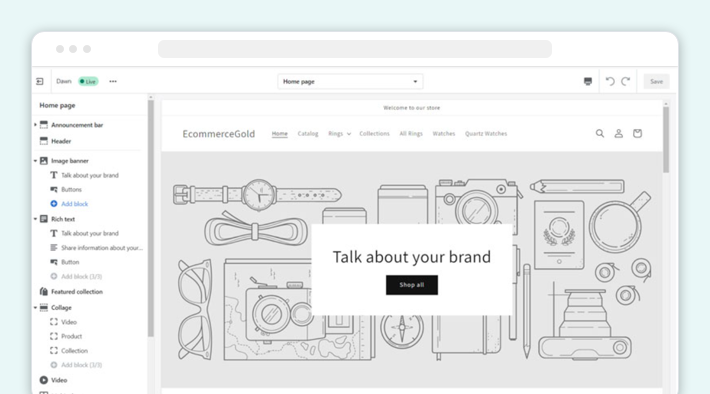
Pros:
- Highly customizable storefronts with custom code support
- 180+ pre-built optimized themes
- Headless storefront support
- Easy scalability for growing businesses
- Robust international commerce capabilities
- 8,000+ free and paid apps for additional functionality and integrations
Cons:
- Using a third-party payment processing provider entails additional transaction fees
- Some capabilities require paid third-party apps
What Square Has to Offer
Square Online allows you to launch a free online store on a Square domain. The online store integrates seamlessly with the Square POS system and customer directory. However, many of Square’s customization and eCommerce features are available only in a paid plan.
Overall, Square is quite limited in customization, scalability, and social and marketplace commerce.
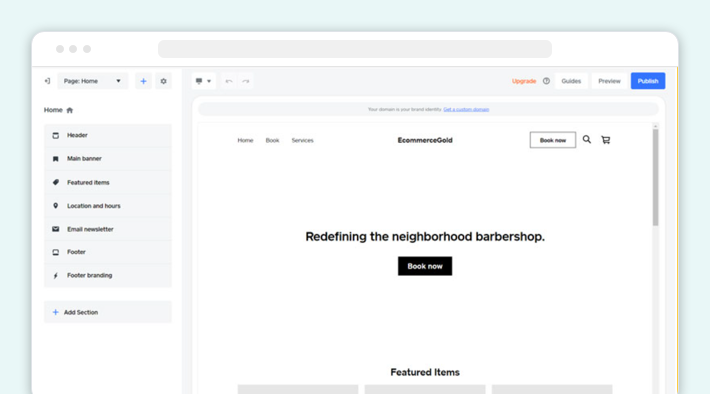
Pros:
- Possible to launch an online store quickly and for free
- Seamless sync with Square’s POS system and customer directory
- Robust payment processing options for offline and online sales
- Simple inventory management and order fulfillment
- Support for integrations with other eCommerce platforms (Wix, WooCommerce)
Cons:
- Website builder is limited in customization options, especially on the free plan
- Social commerce features are limited, especially compared to Shopify
- Fewer app integrations available on the Marketplace
Verdict #2
Shopify wins this round with a more comprehensive eCommerce toolkit, diverse customization options, and the ability to meet the needs of businesses of all sizes.
However, if the POS system is more important for you when considering Shopify or Square, this is where Shopify falls somewhat short.
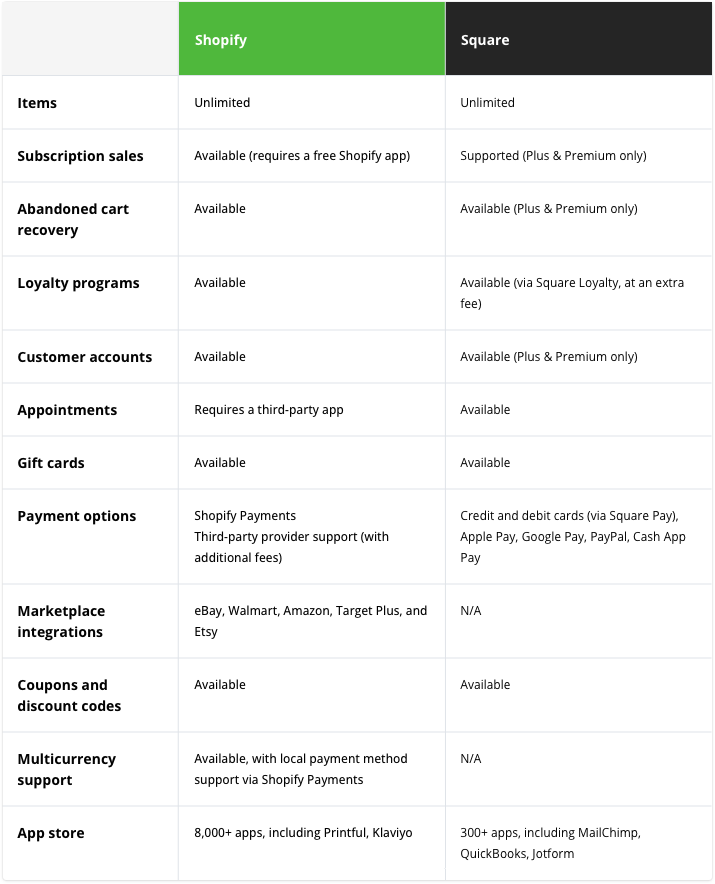
Shopify vs Square: Customer Support, User Experience and Pricing
Which platform offers better customer support, user experience, and pricing?
Customer Support
Square offers support by phone and via chat. Standard support is available Monday to Friday from 6 am to 6 pm PT. Round-the-clock phone support is available only to Premium users.
Shopify, in turn, offers 24/7 live chat support to all customers. (However, you must first go through an AI chatbot.) Shopify also offers 24/7 phone support to all users.
User Experience
Square Online users rated it 4.2/5 on G2, citing its ease of use as one of its main advantages. This includes building a website using a drag-and-drop builder and navigating the user interface overall.
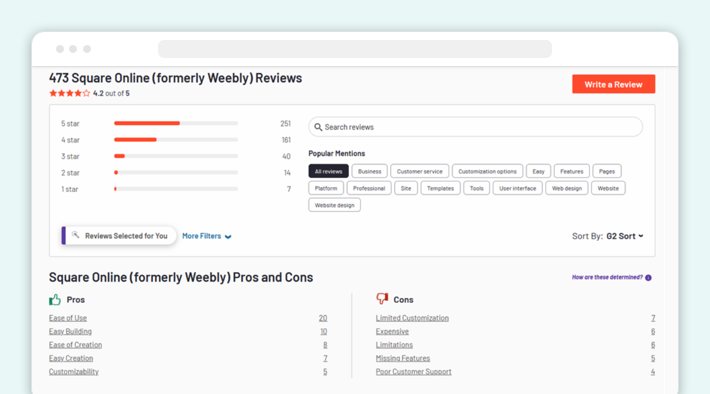
Shopify, on the other hand, scored a higher rating on G2: 4.4/5. Ease of use is also the number one cited advantage of the platform, with easy integration and quick setup also frequently mentioned. However, the Shopify admin panel can be somewhat overwhelming to beginners due to the sheer number of features and menus available.
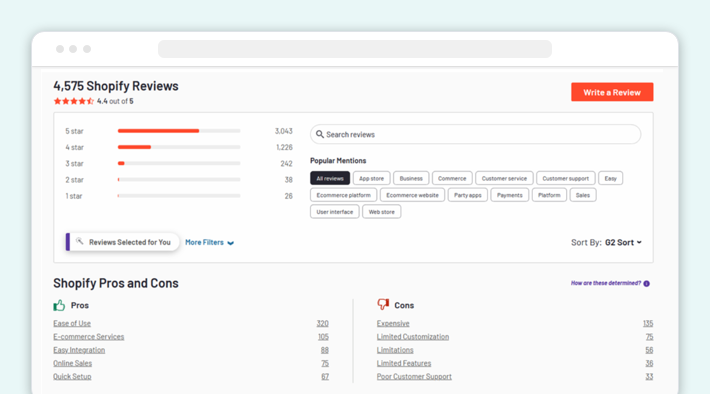
Pricing
In the Shopify vs Square showdown in pricing, the main difference is that Square offers a free plan for its online store and POS merchant system, while Shopify doesn’t. That said, Shopify offers progressively lower processing fees for more expensive plans.
Whether you choose Shopify or Square, you’ll have to pay payment processing fees in addition to the subscription fee.
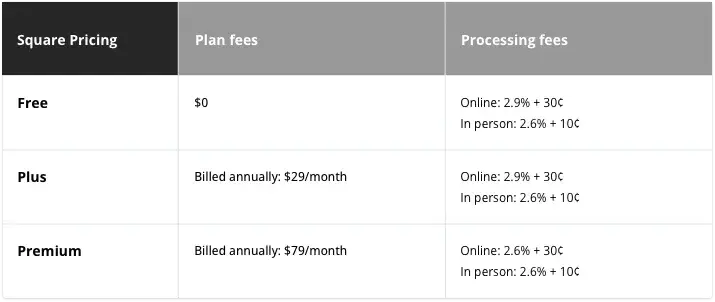
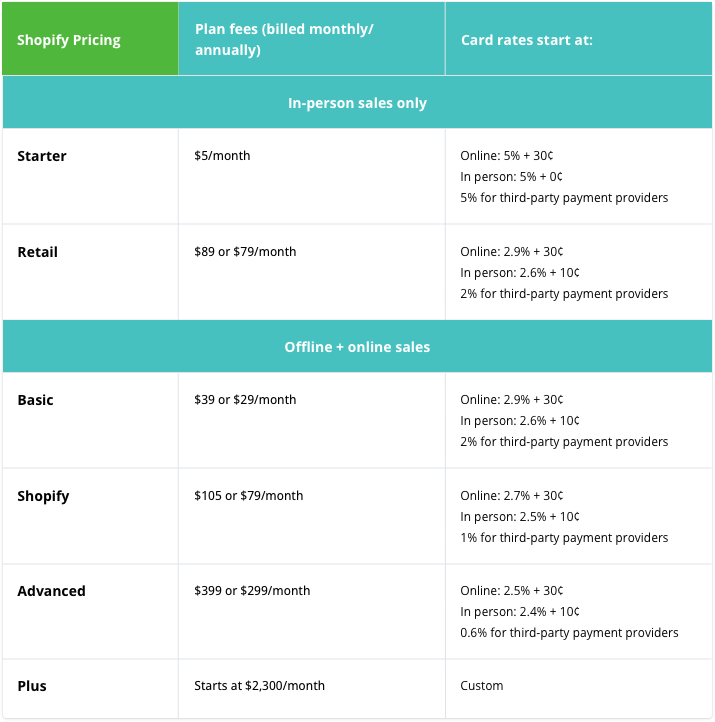
These Real-World Businesses Made Their Choice
Is Shopify or Square better for your business? Here’s how these two businesses made their choice.
Poor George Chose Square for Business Management and Omnichannel Retail
This retail store, based in Cold Springs, NY, leveraged Square’s POS and online store capabilities to support its growth into an omnichannel business. On top of that, Poor George also used Square’s financial services and marketing capabilities.
Founded as a vintage pop-up in 2013, Poor George grew into a physical shop with an online store. As business volumes increased, handling multiple channels while also managing all aspects of running a business became overwhelming for its owner.
That’s why Poor George chose Square to facilitate business management and omnichannel retail. Adding an online store led to a 20% increase in sales, while Square’s Gift Cards helped generate thousands of dollars in extra revenue.
Flying Tiger Selected Shopify for International Commerce
Flying Tiger Copenhagen is a chain of 950 brick-and-mortar stores founded in Denmark in 1995. The company chose Shopify to optimize its eCommerce operations and expand into multiple markets.
Before turning to Shopify, Flying Tiger was using a legacy enterprise system to run its physical and online operations. However, it was cumbersome and lacked international commerce features the company needed to provide outstanding customer experiences in every market.
Flying Tiger chose to migrate to Shopify to offer multiple payment methods across countries and tailor checkout to each market, improving customer experience as a result. After moving to Shopify, the company saw conversion rates double, with sales increasing fivefold.
Conclusion
When comparing a Square online store vs Shopify, you need to zero in on your requirements first, from process automation to international commerce features. Factor in your budget, sales volume and channels, market, preferred payment methods, and product type(s), as well.
In general, Shopify is a better investment for businesses that:
- Operate or plan to operate in multiple markets
- Grow rapidly and need scalability
- Focus on online sales, with no or few in-person sales
Square, on the other hand, is more suitable for:
- Small businesses, including new businesses
- Businesses that primarily operate offline, with the online channels being secondary
- Entrepreneurs looking for a solution to streamline business management
If you’re planning to migrate to Shopify from another platform, we have a detailed Wix to Shopify migration guide for you.
Not sure which eCommerce platform offers the best ROI in your particular case? We’d be happy to help you settle on the right platform for your needs. Drop us a line to discuss your challenges and requirements with our eCommerce experts.
Frequently Asked Questions
What are the key factors businesses should consider when choosing between Square and Shopify?
- eCommerce features
- Point-of-sale system availability
- Business management features
- Customer support options
- Ease of use
- Integrations with third-party services
- Pricing
- Scalability
Can Square be integrated with Shopify?
That said, you can use a workaround – in the form of a third-party Shopify app – to integrate Square with Shopify. Popular apps include Checkout Republic App, SkuIQ, and Zapier.
What types of businesses typically benefit from using Square the most?
- You’re a solo entrepreneur or a small business
- You’re an offline-first business with some online sales on the side
- You run a food and beverage or retail business
- You’re looking for a solution to streamline business management
What types of businesses typically benefit from using Shopify?
- Businesses operating in multiple markets
- Online-first businesses, especially the ones relying on social commerce and marketplace sales
- Fast-growing businesses that need scalability
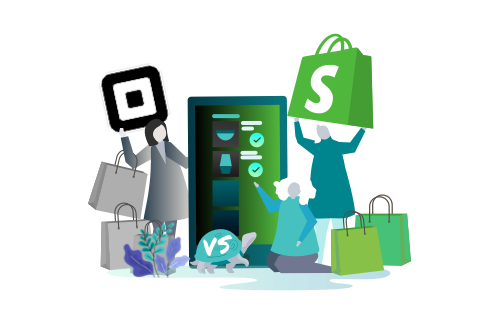

![Shopify Sales Channels [Complete Guide] - GenovaWebArt blog article, banner image Shopify Sales Channels [Complete Guide] - GenovaWebArt blog article, banner image](https://genovawebart.com/hubfs/img/webp/hero-banner-blog-article-shopify-sales-channels.webp)



